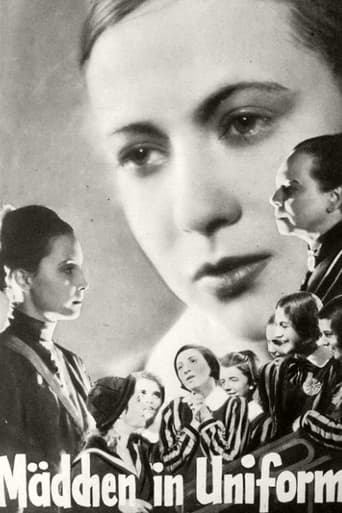Syl
What's a girl to do when she is surrounded by women in a female boarding school? She falls in love with her female teacher who shares some mutual feelings. This film is not so much about lesbianism as it is about Germany was striving to become so disciplined and unfeeling towards one another. Of course, lesbianism was bound to happen. There were no other options. You have a girl who wants to be loved and love just seems unthinkable in the German culture of the Nazi uprising. Even though this film was made in 1931, the girls' uniforms reminded me of the concentration camps uniforms. The school was trying to discourage close relationships between girls and among teachers and students. I don't think of it much as a lesbian film as a chilling portrait of how Germany was bounded for destruction during World War II. Maybe the film points as a good reminder of how relationships should be encouraged and feelings are human. This school was trying to restrict the girls' humanity into an almost robotlike existence. That's how I always saw this film. I never thought of it as a lesbian film because the girls in the school had no other choice or option. They weren't allowed freedom and that's what the major theme of this movie is. Germany was beginning to restrict it's freedom on their citizens and forcing them to become less human in order to succeed but that's just my opinion.
davorka46
Girls in Uniform is a feminist classic.This film is one of the hidden themes of early German cinema. For a movie that was made in 1931 the structure was very good. Light is used to indicate the repression of the girls. The girls were in a world full of darkness by the authorities of the boarding school. The interesting thing was that the main focus was on the relationship between Manuela and her teacher, there were other relationships too but they ware not the main focus. My feeling is that none of those girls were happy in that school but they learned to handle the situation and simply to live with it.
badmaash9911
Madchen in Uniform was a surprisingly bold movie for its time. Set in Germany, before the Nazis came into power, Madchen in Uniform addresses the issue of lesbianism in an all girls boarding, and, in a broader sense, society. Although by no means as graphic and as explicit as films produced today, Madchen in Uniform was still a candid portrayal of homosexuality for its time. Aside from the actual topic though, I personally didn't feel that there was much to the movie. The movie lacked any real plot. It mainly revolved around a young girl, who, because of being homesick, found both security and love in a teacher. It is true that the movie was a source of much controversy, but as far as I'm concerned, this is the entire movie was able to accomplish.
zetes
Ever wonder what European soft-core porn would look like in 1931? If you do, you are weird. But, if you do wonder what it'd be like, check out Maedchen in Uniform. To be fair, it is a bit more artistic than Emanuelle, but there is little subtlety to the lesbian erotica happening in this film. It turns out better than it started. I actually felt the characters' troubles to be honest and touching by the end. I cared what happened.I also believe that this film must have been somewhat well known to European filmmakers at the time. The direction is excellent, and it reminds me a bit of such directors as Jean Vigo and Jean Renoir among others.





